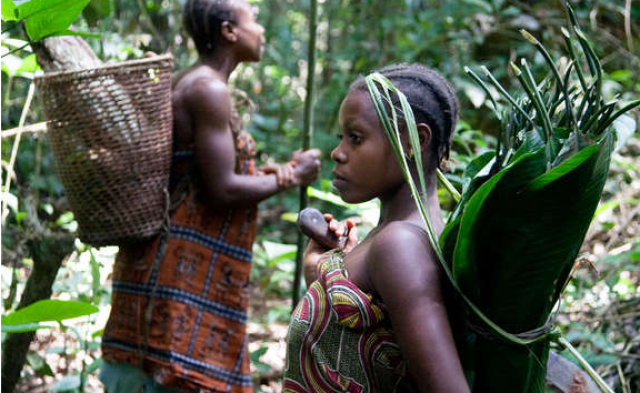From colonialism to COVID-19, Indigenous peoples show resilience in the face of evictions

Baka community in Cameroon
From colonialism to COVID-19, Indigenous peoples show resilience in the face of evictions
August 9, 2020 By Joan Carling and Mike Taylor Africa, Asia, Story
Today is the International Day of the World’s Indigenous Peoples. It is a day dedicated to celebrate and honour the cultures, history and rights of the 476 million Indigenous peoples across the globe.
With special emphasis this year on resilience in the face of COVID-19, it’s time to turn the spotlight on the strength and dignity of Indigenous peoples and acknowledge the contribution they make protecting our planet.
Forests, wildlife and biodiversity managed by Indigenous peoples and local communities are critical in preventing future pandemics. Further, they store 37.7 billion tonnes of carbon – more than the world’s 2013 emissions of CO2 from fossil fuel combustion and industrial processes. Yes, the role that Indigenous peoples have always played as the guardians of our planet benefits all humanity. But even more importantly, it is their right to be there, to have peace of mind and a sense of security over their homelands.
Over recent months, we have seen a rise in global consciousness, with many people waking up to the fact that most economies have been built on the basis of exclusion, discrimination, and exploitation of peoples and communities. Movements such as Black Lives Matter are shining light on the systemic racism and inequity that are embedded in the bones of our societies. This has been the historic struggle of Indigenous peoples and many other communities, having endured centuries of dispossession and ethnic violence undermining their dignity and wellbeing.
As people take to the streets in parts of the world to protest for justice and equity, we’re seeing an alarming trend where Indigenous peoples and communities are being hit with the “same old” threat of land grabbing, only now under the guise and cover of a government sanctioned lockdown. This in turn facilitates the impunity of such evictions and puts displaced communities at a higher risk of being exposed to the global pandemic in a vicious cycle.
Defending the planet has never been more deadly for Indigenous peoples. Data released last week by Global Witness shows that 40% of the land and environmental defenders who lost their lives in 2019 were from Indigenous communities.
Looking ahead to recovery from the pandemic, we fear an acceleration of evictions. Governments trying to kick-start economies may ignore high social and environmental costs and target Indigenous peoples and local communities’ lands and territories, which are rich in biodiversity and resources.
Strong evidence of this has been gathered by the Defending Land and Environmental Defenders Coalition –among them, the Business and Human Rights Resource Centre, Frontline Defenders, Global Witness, the World Resources Institute and the International Land Coalition– using LANDex, a global monitoring system dedicated to democratizing land data, to document COVID-related repression, violence and reprisals against defenders.
In Kenya, Ogiek and Sengwer Indigenous communities have been systematically forced from their forests since British colonization. History keeps repeating itself, as the Kenyan government evicts them from their homes even in the midst of the current outbreak. For the Ogiek, not even the gained restitution of their legitimate rights, as decided by the Africa Court on Peoples and Human Rights, could stop this injustice.
Meanwhile in Nepal, houses belonging to Indigenous Chepang people are being burned to the ground by Chitwan National Park authorities, despite having legal rights to live there. The catastrophe has displaced around 60 families, leaving them homeless in times of heavy rains and a global pandemic.
Amidst the COVID-19 lockdown, forest officials of the Odisha Forest Department in India unjustly evicted 32 Kondh adivasi families of Nehela village under Jugsaipatna Panchayat in the Kalahandi district on 24th April 2020. The victims’ houses were forcibly dismantled without prior notice, and their belongings thrown to the ground.
Conservation continues to be used as a justification for these evictions, despite the recognized role Indigenous peoples and local communities play in protecting our planet’s biodiversity. Many national parks and conservation areas are run jointly by governments and conservation organizations in a way that prevents Indigenous peoples from using these areas for their livelihoods and cultural practices. This approach is unjust and inconsistent with the urgent need for a holistic and sustainable way to manage and conserve resources – an approach based on the reciprocal and interdependent relationship between humanity and nature, as practiced by Indigenous peoples.
As we move towards a post-Covid world, we will see an increased pressure for fast economic gain at the expense of people and nature. There is always, however, a more inclusive path to re-building our economies, that emphasizes sustainable use of natural resources, respects human rights and addresses systemic causes of inequality. We need to hold accountable those who harm our environment and give decision making power to those who are protecting it, so they can live in dignity and peace. Although it may take longer, it will be more sustainable for the long haul and of course, better for our planet.
Author Bios:
Joan Carling is an Indigenous activist from the Cordillera, Philippines, and co-convenor of the Indigenous Peoples’ Major Group (IPMG), co-director of the Indigenous Peoples Rights International (IPRI), and leads a global campaign against the criminalization of and impunity against Indigenous peoples: https://www.indigenousrightsinternational.org/
Mike Taylor is Director of the International Land Coalition (ILC), a global network pushing for people-centred land governance.
Related Project:
Categories
Latest news
- LifeMosaic’s latest film now available in 8 languages
- การเผชิญหน้ากับการสูญพันธุ์ และการปกป้องวิถีชีวิต (Thai)
- LANÇAMENTO DO FILME BRASIL : Enfrentando a Extinção, Defendendo a Vida
- Enfrentando la Extinción, Defendiendo la Vida (Español)
- Peluncuran video baru dalam Bahasa Indonesia : Menghadapi Kepunahan, Mempertahankan Kehidupan


